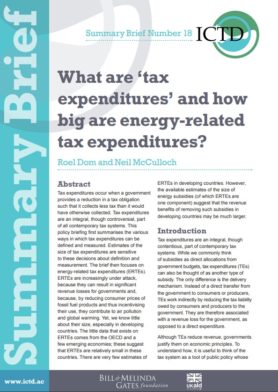Summary Brief 18
Tax expenditures occur when a government provides a reduction in a tax obligation such that it collects less tax than it would have otherwise collected. Tax expenditures are an integral, though controversial, part of all contemporary tax systems. This policy briefing first summarises the various ways in which tax expenditures can be defined and measured. Estimates of the size of tax expenditures are sensitive to these decisions about definition and measurement. The brief then focuses on energy-related tax expenditures (ERTEs). ERTEs are increasingly under attack, because they can result in significant revenue losses for governments and, because, by reducing consumer prices of fossil fuel products and thus incentivising their use, they contribute to air pollution and global warming. Yet, we know little about their size, especially in developing countries. The little data that exists on ERTEs comes from the OECD and a few emerging economies; these suggest that ERTEs are relatively small in these countries. There are very few estimates of ERTEs in developing countries. However, the available estimates of the size of energy subsidies (of which ERTEs are one component) suggest that the revenue benefits of removing such subsidies in developing countries may be much larger.

